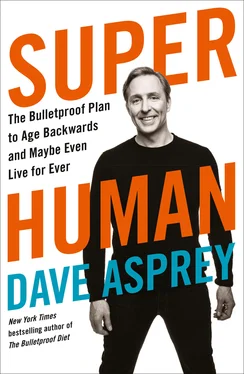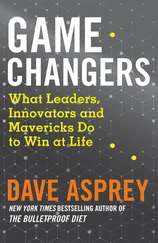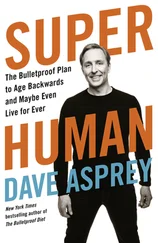Exercise is another important way of preventing early telomere shortening. Researchers in Germany looked at telomere length in four groups of people: those who were young and sedentary, those who were young and active, those who were middle-aged and sedentary, and those who were middle-aged and active. There wasn’t much of a difference between the two groups of young people, but when the participants were middle-aged, the change in telomere lengths was striking. The sedentary middle-aged folks had telomeres that were 40 percent shorter than the young people, while the active middle-aged folks had telomeres that were only 10 percent shorter than the young people. In other words, the active group reduced their telomere shortening by 75 percent. 39Exercise significantly reduces perceived stress levels and inflammation, 40which may help to explain these results.
There are two promising lines of research about lengthening telomeres. One is a synthetic peptide called Epitalon that is modeled after a peptide your pineal gland produces (epithalamin). The research on Epitalon goes back to 2003, but no one has commercialized it. When researchers injected Epitalon into mice, it was shown to increase their life-span by up to 13.3 percent by activating telomerase 41while turning on apoptosis and slowing down tumor growth. 42
Someone with identical biology to me (ahem) has been injecting Epitalon for ten days every few months for the past several years despite the fact that it is not yet approved for human use and may never be, even though it seems to work. In fact, anti-aging substances like Epitalon often exist in a strange limbo. The pharmaceutical companies don’t develop them because they’re not patentable, which means they won’t pay for the huge studies the FDA requires before approving them. The result is that you can find Epitalon affordably online, but it’s hard to know that you’re getting it from a reputable source. To me, the risk-reward ratio is worth it, but this may not be the case for you.
Another supplement called TA-65, the name brand of cycloastragenol, also activates telomerase. 43It is incredibly concentrated extract of an Ayurvedic herb called astragalus. By law, the makers of TA-65 can’t call it an “anti-aging” drug because it hasn’t been proved to extend life-span. But studies on this molecule show that in humans, it improves biological markers associated with health span through the lengthening of telomeres and rescuing of old cells. The downside here is that it is quite expensive. If you’ve experienced a lot of stress and/or feel that you are aging more quickly than you’d like and it’s in your budget, this might be worth considering. There are generic versions available, too.
Until we know more about how to maintain telomere length, avoiding excessive environmental stress and taking measures to reduce your psychological stress is a good start, along with getting good quality sleep to recover from stress that is truly unavoidable.
You’ve probably noticed that these simple interventions—good food, the right environment, moderate exercise, stress control, and quality sleep—are the best and most effective ways of avoiding all Four Killers and even slowing down or reversing many of the Seven Pillars of Aging. And you’re right! The vast majority of the hits to your mitochondria that cause aging come from your food, your environment, and your lack of quality sleep. So, before we move on to aging backward, let’s take a closer look at the most important ways to avoid dying. After all, what’s the point of being a Super Human if you’re dead?
Bottom Line
Want to not die? Do these things right now:
• Kill off death-resistant cells with natural or pharmaceutical compounds such as AEP, fisetin, and piperlongumine.
• Consider getting anti-aging drugs like rapamycin or metformin from your doctor.
• Stop eating fried, grilled, or charred meat. It’s just not worth it if you want to live a long, high quality life.
• Manage stress—meditate, practice yoga, get good quality sleep, and/or delegate tasks that are draining you. This is not indulgent or selfish—it will literally help you live a longer and fuller life.
• Consider supplementing with vitamin D to help your body avoid forming dangerous misshapen proteins.
• Do what it takes to find out which foods are not compatible with your biology, either through an elimination diet or a food sensitivity panel, and stop eating those foods.
3
FOOD IS AN ANTI-AGING DRUG
By the time it became clear that inflammation made me feel like crap and was aging me rapidly, I had conducted enough semi-successful experiments on myself to know that of all the things I could control, food had the biggest impact on how I felt, how I performed, how inflamed I was, and therefore how quickly my body aged. Armed with this experience and the lifetimes of knowledge distilled from medical reports, biochemistry, and experts at SVHI, I set out to determine once and for all which foods and compounds supercharged my mitochondria and reduced inflammation and which led to inflammation, dysfunctional mitochondria, and rapid aging. Fortunately, most of the good stuff also tasted good!
Years later, I wrote Game Changers , based on a survey of almost five hundred people who had done big things in the world—I wanted to figure out what made them tick, what qualities these superstars had in common. The results showed that high-performing people know that getting their food right is the number one human upgrade, even though different people found that different foods worked best for their individual biology. Nutrition is essential not only for Super Human biology but also for Super Human success.
GRAINS, GLUTEN, GLUCOSE, AND GLYPHOSATE (OH MY)
In my mid-twenties, I figured out how to lose fifty pounds of fat, decrease inflammation, gain energy, and gain positive changes to my personality using multiple versions of a low-carbohydrate, high-protein diet. I was happier and less angry, and had more friends and more energy. It was clear that something in my diet had caused these drastic changes. As I experimented with different types of carbs, I realized that for me, gluten was the number one culprit. Even though I do not have celiac disease, a condition that makes the small intestine hypersensitive to gluten, my body did not tolerate gluten well, and responded with chronic inflammation and changes to my personality that were far from positive.
Chances are you’ve already heard about the damaging effects of gluten, along with strident, shrill misinformation about how only people with celiac disease should avoid it. The sad truth is there is plenty of research to show that eating wheat—not just gluten, the protein found in wheat—is aging for the rest of us, too. Wheat causes inflammation and gastrointestinal distress and contributes to autoimmune disease and a host of other issues by stimulating an over-release of zonulin, a protein that controls the permeability of the tight junctions between the cells lining your gut. It does that whether or not you tell yourself that you tolerate wheat just fine.
With excess zonulin, the gaps between your intestinal cells open, allowing bacteria, undigested food, and bacterial toxins to flood into your bloodstream. Those toxins, called lipopolysaccharides, or LPSs, lead to inflammation throughout your body. They make you old, 1and as you get older, the accumulation of hits from LPSs impacts your health more and more. 2They do this no matter what you think about gluten.
Gluten also reduces blood flow to the brain, interferes with thyroid function, 3and depletes your vitamin D stores. 4As you read earlier, vitamin D deficiency can cause proteins to lose their shape and clump together, forming dangerous and aging plaque deposits.
Читать дальше






